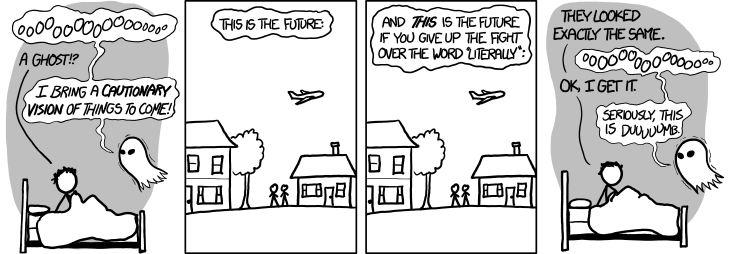But, can we at least try? When I find out that "literally" has been effectively sanctioned by some dictionaries to be used simply for emphasis, it's a bridge too far. If somebody says "me" instead of "I" or puts an apostrophe in the wrong place, I don't really care because I know what you mean. But if you, like a former colleague of mine, say to a co-worker, "I literally have nothing to do!" you need to realize that it is literally impossible for the sentence you just uttered to be true.
"Literally" is not a flavoring word. It means that what you're saying is exactly, word-for-word, what you mean, with nothing figurative about it. (The Oatmeal explained it very well and in a much funnier way than I could.) If you say, "you literally couldn't make this stuff up," you're making the word mean the opposite of what it actually means, and now all of a sudden we do have a communication problem. Worse, there is no other word that precisely means the same thing, so once everybody thinks it just means "very" or "really" then how is anyone supposed to communicate the concept of "literal" and expect it to be understood?
Almost every superlative in English now means "very" or "good," actually. We feel like we have to describe everything as "incredible," "unbelievable," "ridiculous," "fabulous..." Why do you think we had to invent the word "ginormous?" Because all the other words like "huge" and "enormous" that used to mean "ginormous" lost their meaning so we couldn't get the point across anymore! "Absolutely" just means "yes" now. I do it myself and make myself cringe as it comes out of my mouth. It's the triumph of marketing-speak, I guess.
So please, just stop it. I don't ask for much, but I gotta' draw the line somewhere. Can we save this one word? Don't make me take Randall Munroe's advice:
I'm not ready yet.

Tots awesome stuff here. I like agree.
ReplyDelete